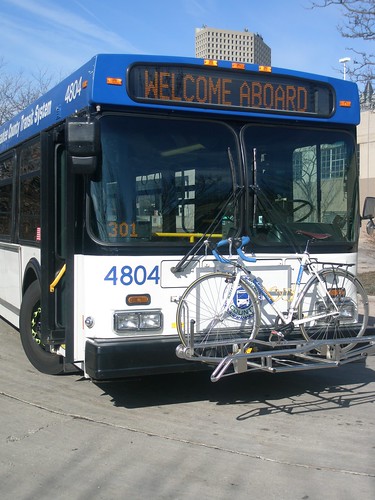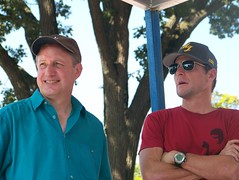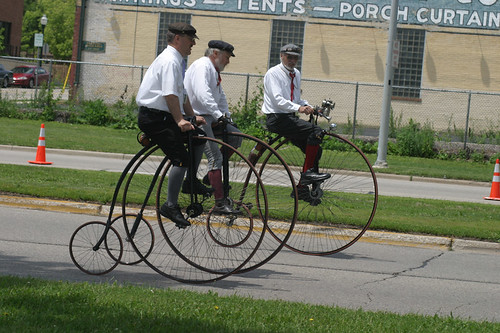A group of Madison bike supporters have created a series of events, Madison Bike Winter, to help all of us hop on our bikes a bit more this winter. The next Bike Winter event is tomorrow! Don’t miss it…
Santa Rampage/Ugly Sweater Ride
Saturday, December 18, 11am
Starting from Espresso Royale (650 State)
This ride is planned for participants to either break out their Santa suits or a favorite UGLY sweater and go for a short ride from downtown stopping a various establishments for hot/cold beverages along the way.
Bike Fed Member, Mindy Preston, provides a recap from the last Madison Bike Winter Event.
Madison’s first annual Bike Winter Fashion Show was a dazzling event, even after the models removed their reflective jackets, safety vests, and blinking lights. Ten models gathered to show off what keeps them warm on their winter rides, which ranged from 20 minute commutes around campus to hours-long snow endurance races. Whether models were showing off base layers, rain pants, goggles, or their work attire, all agreed that you don’t have to sacrifice comfort to ride your bicycle in the winter.
Event models began by talking about their full riding ensembles. Outer layers – for keeping out snow, wind, and slush – often had reflective elements as well, for additional safety. Beneath that, cyclists showed an astounding variety of warmth layers, ranging from layers of normal street clothes to high-tech sport-specific gear. Many models demonstrated layering vests and scarves over shirts to keep the core as warm as possible. Most wore “base layers” (also known as “long underwear”) made of wool or synthetic materials, as wet cotton feels very cold next to the skin.
Cyclists shared a number of strategies for keeping the weather off sensitive skin, and staying comfortable even in the coldest temperatures. Liners, mittens, lobster gloves, and bar mitts all had their time in the limelight. Models suggested covering faces and ears with balaclavas, scarves, masks, goggles, hats, and helmet covers.
Audience members included seasoned cyclists, prospective winter cyclists, and folks new to the upper Midwest’s temperature extremes. ”It seems very possible to ride in winter,” a prospective rider commented after the show. “If you ride the bus or walk in the winter, you probably have all the gear you need,” another said. Madison Bike Winter’s organizers agree, and welcome new winter riders to join the Madison Bike Winter group on Facebook to hear about fun winter cycling events.






 Two statewide projects also received funding in this round, including the Bike Fed's
Two statewide projects also received funding in this round, including the Bike Fed's 
.gif)
.gif)
.gif)
.gif)
 On Tuesday, October 5,
On Tuesday, October 5, 


 Have you ever considered going to work, the grocery store or a friend's house by bike, but aren't sure which route to take or what type of bike gear you might need?
Have you ever considered going to work, the grocery store or a friend's house by bike, but aren't sure which route to take or what type of bike gear you might need?







 What: Milwaukee by Bike 2010 Bicycle Master Plan Open House
What: Milwaukee by Bike 2010 Bicycle Master Plan Open House We had a wonderful time at Milwaukee's first-ever
We had a wonderful time at Milwaukee's first-ever